Media Release: Celebrating the 10th anniversary of Saint Mary MacKillop’s canonisation
October 15, 2020Sydney, 12 October 2020: This Saturday 17 October 2020 will mark the 10th anniversary of Saint Mary MacKillop’s canonisation at Saint Peter’s Basilica in Rome, declaring her Australia’s first canonised saint.
Pope Benedict XVI addressed tens of thousands gathered in St Peter’s Square. About 9000 Australians travelled to celebrate this occasion.
For Catholic, Christian and secular Australians, it was a meaningful moment, celebrating the values at the heart of what it means to be Australian, as well as her witness to the sacred in everyday life. Ten years on, the Sisters of Saint Joseph invite the Australian community to take this opportunity to reflect on what the canonisation of Saint Mary MacKillop meant to Australians then, and what it means to us now.
To celebrate the 10th anniversary of the canonisation of Saint Mary MacKillop and the wonderful life and legacy she left behind, the Sisters of Saint Joseph of the Sacred Heart are pleased to remember her with commemorative prayers, videos, and a global vigil in her honour.
Inspiring all Australians to take courage and maintain hope as Mary did throughout her life, the theme chosen for this celebration is ‘Take Fresh Courage’. This theme chosen against the backdrop of the many challenges Australians have faced in 2020 is taken from a letter written by St Mary MacKillop in 1877.
On 16 October 2020 at 8pm AEST, the Sisters of Saint Joseph will hold Courage Hour, a global vigil of deep peace, prayer, and reflection. The Sisters invite all who may wish to participate to join the Vigil online www.sosj.org.au/10th-anniversary and celebrate Mary’s life and follow her lead to ‘Take Fresh Courage’…
Please continue reading the Media Release here (PDF)
For more information, please contact:
Kathleen Norman
Communications Manager
Sisters of Saint Joseph
Kathleen.Norman@sosj.org.au
+61 2 8912 2722 +61 438 006 566
Join us for Courage Hour
October 14, 2020Join us for a global Vigil to celebrate the 10th anniversary of Mary’s canonisation.
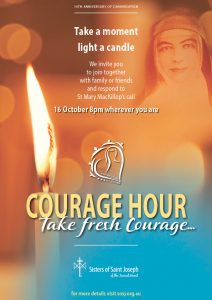 The Sisters of Saint Joseph of the Sacred Heart invite you to join us for a global Vigil of deep peace, prayer and reflection to celebrate the 10th anniversary of Saint Mary MacKillop’s canonisation.
The Sisters of Saint Joseph of the Sacred Heart invite you to join us for a global Vigil of deep peace, prayer and reflection to celebrate the 10th anniversary of Saint Mary MacKillop’s canonisation.
This Vigil invites us to come to peace and prayer and wrap our world in courage, that same courage from which Saint Mary MacKillop lived her life. Together let us ‘Take Fresh Courage’ for ourselves and for our world.
You may pray this Vigil alone; in a face-to-face group or perhaps join the online Guided Reflection.
The Sisters of Saint Joseph will be providing a scripted video resource that you can use for the online Guided Reflection, which is something that can be played at any time. The script for Courage Hour is also available in the Encountering St Mary MacKillop in Prayer booklet starting at page 26 available in English, Spanish and Italian on the webpage below.
Please note, the online Guided Reflection is not live and does not require you to register.
This Vigil will take place on Friday 16 October at 8:00pm your local time.
To view the video and Encountering St Mary MacKillop in Prayer booklet, visit the webpage provided below:
Celebrating Mary’s Canonisation
Together, we can all follow Mary’s lead and #TakeFreshCourage.
Our Inspirational Saint Mary of the Cross
October 8, 2020This month we pay a special tribute to Saint Mary MacKillop as we celebrate ten years since her canonisation in Rome by Pope Benedict XVI.
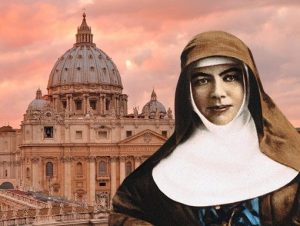 As Australia’s first Saint we reflect anew on this woman close to our hearts who demonstrated a passion for justice, a respect for human dignity, the courage of her convictions and feminist leadership is our own Mary MacKillop. She set hearts of the young women who flocked to join her on fire; she was true to her values and unwaveringly acted accordingly. She knew hardship, illness and concerns about the congregation and her family. Her life was anchored in the love of the God she trusted and in in providential care she placed her life. As her followers we applaud her place in society, and in the church. We appreciate the example that she has given us to live by. May this coming celebration of the ten years since canonisation grant us a deeper understanding of her greatness and holiness and inspire us by her courage and faithfulness.
As Australia’s first Saint we reflect anew on this woman close to our hearts who demonstrated a passion for justice, a respect for human dignity, the courage of her convictions and feminist leadership is our own Mary MacKillop. She set hearts of the young women who flocked to join her on fire; she was true to her values and unwaveringly acted accordingly. She knew hardship, illness and concerns about the congregation and her family. Her life was anchored in the love of the God she trusted and in in providential care she placed her life. As her followers we applaud her place in society, and in the church. We appreciate the example that she has given us to live by. May this coming celebration of the ten years since canonisation grant us a deeper understanding of her greatness and holiness and inspire us by her courage and faithfulness.
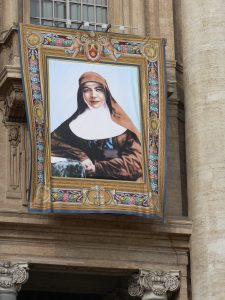 Our down to earth Mary is a Saint many can relate to, being both feisty and fearless yet human and ordinary. We recognize her saintliness which is an inspiration which offers a vibrancy and active presence for Australians today.
Our down to earth Mary is a Saint many can relate to, being both feisty and fearless yet human and ordinary. We recognize her saintliness which is an inspiration which offers a vibrancy and active presence for Australians today.
Each of us will have our own jubilant recall of this great event in our lives and in the life of the Church. Let us all look forward to the celebration with triumphant joy!
Let us take time to ponder the part that St Mary MacKillop plays in our lives by her example of life and her faith in God.
- Can you recall where you were ten years ago when Mary’s sainthood was proclaimed? Did you watch the event in Rome, or locally? Perhaps you caught a glimpse on the nightly news.
- Is Mary’s influence on your life from her from the love of the people in need, her determination in life’s events or devotion to her family?
Let us celebrate this wonderful woman and ask God’s blessings that we have the strength and inspiration to live the best life we possibly can.
Michele Shipperley rsj
Take Fresh Courage
September 16, 2020Share the Hope.
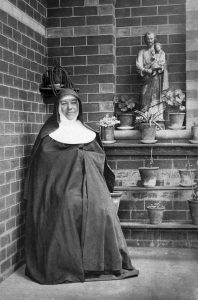
In 1902, at the age of 60, Mary MacKillop suffered a stroke. Her mind was unaffected and her speech intelligible, but, with her right side paralysed, she had to make major adaptations to her life. She now walked with a stick and, towards the end of her life, was eventually confined to a wheelchair. She dictated letters, but also learnt to write with her left hand and took up typing – the typewriter being at the time quite a new invention. She continued to govern the Congregation of the Sisters of St Joseph as Mother General and, over the next seven years, visited Sisters all over the country, opening up new works and responding to needs wherever she found them.
Certainly, we notice deterioration in significant aspects of Mary’s life as a result of the stroke. But we also notice enrichment. Having to depend more on others, she seems to speak and write words of encouragement more often. Her letters repeat what is at the core of faith and spirituality. She was in constant pain – she described it as being like a giant toothache all through her body – but she found deeper meaning in suffering as displaying in her own body the cross of Christ for our time (cf. Colossians 1: 24).
Reflection on Mary MacKillop
September 8, 2020Samela Harris, journalist, has described Mary MacKillop from the secular point of view that her father Max Harris expressed. Her strong character images of St Mary MacKillop depict, very poignantly, a saintliness, that describes her as a strong woman whom we can imagine in today’s world.
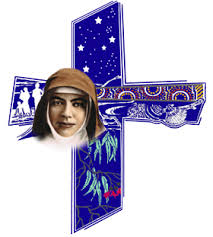
The moment he (Max Harris) came up with that phrase (‘A Saint for all Australians’) he knew it was right and he said so. It was a simple phrase defining Mary’s egalitarian outreach which transcended the ecumenical and embraced all – from the barefooted child and the fallen woman to gentry and ecclesiastical dignitary. Max shared some of those ‘everyman’ qualities with Mary – being one of those people who connected with everybody, and who judged people not by who or what they were but by what qualities of intellect and compassion they demonstrated.
When people read of his passion for the recognition and advancement of Mary MacKillop, it was not a religious issue they perceived but the tale of an extraordinary woman whose life stood aloft. A life of exceptional merit. His love for “A Saint for All Australians” was quick to attract the attention of the Josephites.”
Max tells us Mary was” inspirational, exceptional, courageous, a woman of integrity and altruism. She was a brave feminist who stood up for what she believed, who defied an oppressive patriarchy with determination and humility. He wrote with heartfelt conviction, but also with intellectual potency and objectivity which were hallmarks of his character
And Max kept on writing about Mary, thinking about Mary, loving Mary – and delivering a steady education to the Australian public through the 1970s, 80s and 90s.
In so doing, he quietly joined the small ranks of the lay people who also had championed and helped Mary MacKillop a century before. They were an Adelaide immigrant Jew called Emanuel Solomon and a Presbyterian society queen called Joanna Barr Smith – both unlikely supporters of a young nun. But it was her social activism in the streets of Adelaide, her courage, her altruism, which inspired that support and friendship. And Max kept on writing about Mary, thinking about Mary, loving Mary – and delivering a steady education to the Australian public through the 1970s, 80s and 90s.
Samela Harris – A Love Story between Mary and Max, 10 October, 2010. ABC Religion and Ethics.
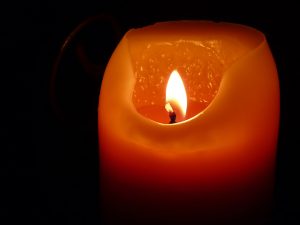 Let us reflect…
Let us reflect…
- What saintly qualities appeal to you from descriptions of Max Harris?
- What characteristics from this account of Mary’s stance for good really inspires you?
- Imagine the absolute courage Mary exhibited in her quest for justice.
Let us with Mary MacKillop pray for an extra measure of strength as we cope with the everyday happenings of life.
Michele Shipperley rsj
Candle image: Candle Flame Wax by stheaker obtained from Pixabay. Used with permission.
So Small a Beginning: Part 5
August 8, 2020Sr Marie Foale speaks about the beginnings of the Institute of St Joseph for the Catholic education of poor children.
She believes that as a young Josephite growing up, she had a sense that one day Mary MacKillop and Julian Tenison Woods had made a spontaneous decision to found an order.
Geocaching
How did you learn about Mary MacKillop?
Maybe it was a book read, a movie, or a visit to a museum. However, thousands of people every year, do none of these things, but do go GEOCACHING! Geocaching is the world’s largest treasure hunt and it can lead you to a journey through the story of Mary MacKillop.
In 2000, when GPS became widely available, a man named Dave Ulmer hid a container, called a cache, in the woods. He noted the co-ordinates of his hide and spread the news to his friends. The first person to find it using a GPS could keep what was hidden in the cache. He also put inside the cache a piece of paper, so that friends could leave their names as finders, even though they didn’t get the prize.
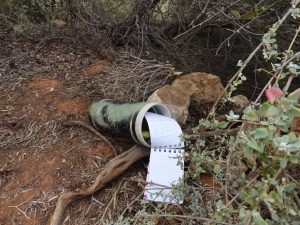
This was the beginning of a worldwide game called “Geocaching.” Friends of Dave went and did their own hides for other friends to find, and consequently many more joined in the fun. In fact, there are now 7 million people looking for more than 3 million caches hidden across the world. And over 150 of those hides are placed at significant sites of the Mary MacKillop story.
Each ‘hide’ in Geocaching has a page on the website with a story about the hide, clues (e.g. size of the container and other hints like, “in a tree”) and a map to find it. When someone finds the hide, they leave their name on the paper inside the cache and type a message on the website.
The first hide for the Mary MacKillop cache series was hidden at Mount Street, North Sydney near the site of her burial place. The hides have now extended to be in all states and territories, as well as New Zealand, Ireland and Scotland. Caches are now near Museums for Mary MacKillop, schools, Statues, Plaques, streets and parks all connected to Mary MacKillop’s story
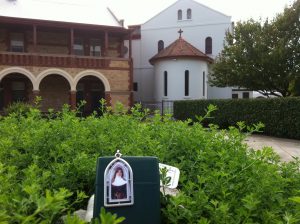
People from all over the world are discovering these hides and learning about Mary MacKillop. In many cases, they had not previously heard of her story. Unlike books, geocaching allows for a physical adventure to places of significance in Mary’s life. Posts on the website by finder’s attribute to this…
I have travelled this road to work for many years. Never knew Mary started this school in my town.
So, if you would like to know more about Mary MacKillop you could read a book, surf the web or visit one of the museums. Alternatively, download the Geocaching App on your iPhone (or visit the website), hit the ‘find a geocache’ button and follow the directions.
A great way to do a pilgrimage… no bookings required!
Happy Geocaching!
Watch a video explaining geocaching here
Julianne Murphy rsj
Reflection on Mary MacKillop
St Mary MacKillop’s Example.
 This year (2020), Australia will celebrate the tenth anniversay of the canonisation of St Mary MacKillop. Let us reflect on Mary MacKillop’s characteristics and the features of her courageous life that gave her sainthood.
This year (2020), Australia will celebrate the tenth anniversay of the canonisation of St Mary MacKillop. Let us reflect on Mary MacKillop’s characteristics and the features of her courageous life that gave her sainthood.
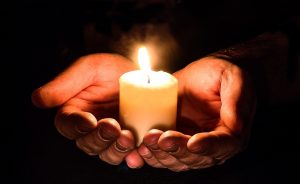 “Holiness, the heart of canonisation, consists in doing the will of God. That is why in those last years of paralysis in her wheelchair Mary was far from being a ‘retired saint’. She was a saint at her very best, because she was doing the will of God in most trying circumstances. It is not achievement that makes saints, it is holiness.” Paul Gardiner SJ 2010.
“Holiness, the heart of canonisation, consists in doing the will of God. That is why in those last years of paralysis in her wheelchair Mary was far from being a ‘retired saint’. She was a saint at her very best, because she was doing the will of God in most trying circumstances. It is not achievement that makes saints, it is holiness.” Paul Gardiner SJ 2010.
Consider:
- Mary endured many trials during her life. Take time to name for yourself what you believe enabled her to rise above these obstacles;
- What do you see as Mary’s saintly qualities that gave recognition to her as a saintly woman whom we recognize as a great example throughout the nation and indeed the world?
- How does Mary MacKillop’s example help us to endure the obstacles in our daily life?
Spend some time in quietness and prayer thanking God for your own and for God’s incredible care.
Michele Shipperley rsj
Candle image: Hands Open Candle by Myriams-Fotos obtained from Pixabay. Used with permission.
